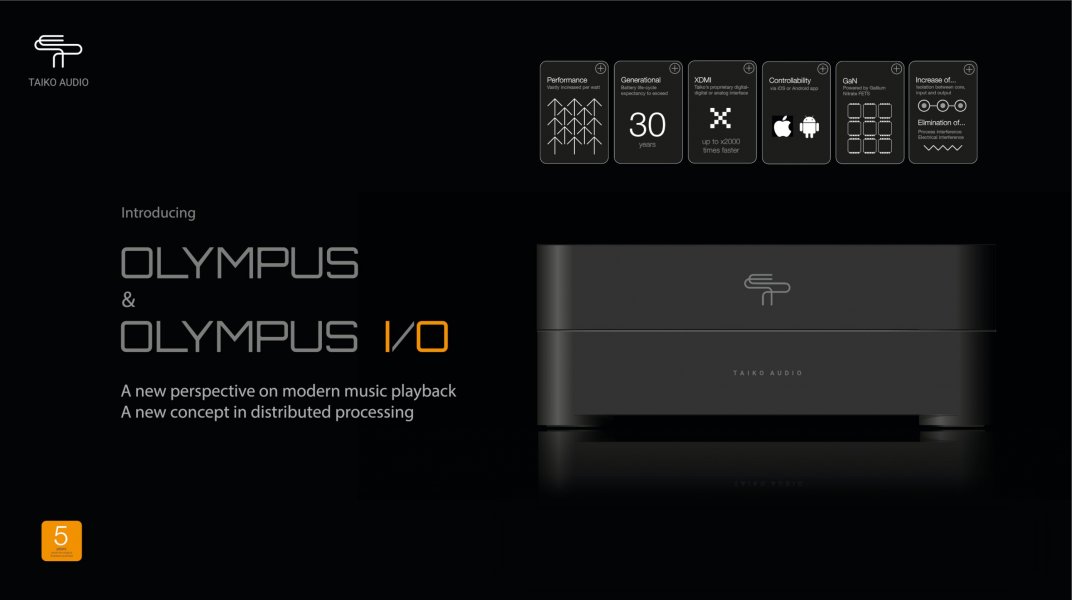Aa far as I can see (please correct me if I am wrong) this limited AES/EBU optional output module is the only way to connect the Olympus using XDMI digitally to a DAC. The technical limitations make this channel subjectively not predictable most of the time and extremely colored in my opinion.
Correct. AES/EBU ( and SPDIF) is the first digital output option board we are supplying for XDMI. This is not because of it's technical properties, but because it's the industry standard for connecting CD transports and therefor fitted in virtually every commercial DAC. This allows you to use XDMI with every DAC, though "performance limited" by AES/EBU's properties.
The other option we're offering at launch is an analogue output module, this does not suffer from interface limitations, the I2S and clock lines are just centimeters long with near perfect signal integrity.
By comparing these 2 options you can get an idea of the effect the interface itself has on sound quality even though these differences are obviously subject to actual DAC/output stage performance or "colouration" / "voicing".
In a nutshell we are proposing that the interface itself is a
mayor contributor to performance, and we are providing these options to proof our case. We can have endless online discussions about why, with as the best possible outcome some sort of consensus without an actual solution, so here we are now, providing you with actual hardware (and software) you can listen to and form your own opinion.
Can I ask why you currently seem to prefer it to your top USB ?
First let me be clear: I do not prefer AES/EBU over USB at all. IMHO USB is superior over AES/EBU for the following reasons:
-It supports all sample rates
-An USB interface generates the sensitive I2S inside the DAC, solving all issues surrounding timing/jitter/clocking sensitivities AES/EBU suffers from, USB interfaces allow the I2S master clock to be provided by the DAC, which is the ideal scenario, over short clock and I2S lines.
However USB has some technical properties we have discovered to be limiting performance as well, we have squeezed it for almost all it's got, and although Olympus and/or Olympus I/O outfitted with USB does improve USB performance significantly over what it currently provides now, it does not address these technical limitations, which cannot be solved as they are inherent to the USB interface.
I'm not going to expose our discoveries, but this has something to do with both the hardware and software, having to convert and/or alter bit streams multiple times before they are eventually converted to I2S. If you do not believe in this having a mayor influence I'd like to refer you to the customer feedback on the recent "NSM" update for our XDMS playback software which only handles bits in a slightly different way. Let's say this is why the "D" is in XDMI, for "Direct", bypassing quite a large number of conversion stages.
To answer your question "Can I ask why you currently seem to prefer it to your top USB ?" :
USB has an undeniable sound signature, AES/EBU also has a signature, all interfaces do. You could describe this as a "digital signature", though let me add I don't actually agree to the "digital" versus "analogue" nomenclature to describe these differences as these are usually used in a way to describe "digital" as something negative relative to "analogue". IMHO "analogue" and "digital" have their own unique types of distortion. "Digital" distortions are actually less offensive to me as some "analogue" distortions, maybe I should just say it, I genuinely don't like vinyl playback. It's just something personal.
XDMI lacks the "digital" signature we're completely used to listening to, but it also does not have any typical "analogue" colourations, hence my description is it does not sound typical "digital" nor does it sound typical "analogue". IMHO it's an evolutionary step up in digital playback fidelity rather then "just" another upgrade. That is however my opinion, we will find out if others agree in a few months.
Yes, it is the choice of dCS stacks and many professional system, for example. Are you considering such option as a supreme alternative? A dual AES/EBU line, as used by dCS and others would pass DXD.
I guess it's not a big surprise that I don't consider this to be a supreme alternative at all. For me it's trying to fix an ancient protocol, designed to be cheap for mass employment in cheap consumer level devices, in an age when there was very little knowledge and/or interest in audiophile level playback fidelity, back when 44.1KHz was considered to be a good choice, and when applying compression was common practice. Choices made nearly 40 years ago still limiting our performance today.



